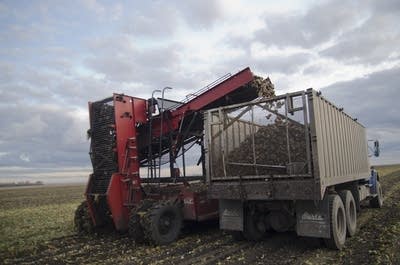Sugar beet harvest goes on in midst of national boycott
Go Deeper.
Create an account or log in to save stories.
Like this?
Thanks for liking this story! We have added it to a list of your favorite stories.

Sugar beet farmers in the Red River Valley are busy harvesting a bumper crop this fall, the second harvest since American Crystal Sugar locked 1,300 union workers out of its five factories in a labor dispute.
Unions hope a national consumer boycott against Crystal Sugar that started Monday will pressure the company to settle, but the beet farmers who own the American Crystal Sugar cooperative are not feeling that pressure.
For farmers like David Kragnes, the big push is to load beets from fertile fields into trucks. Sugar beets are the most consistently profitable crop Kragnes raises, and when he hears the thump of beets hitting the metal truck box, for him it's the sound of money.
• Click for more photos of the Red River Valley beet harvest
Turn Up Your Support
MPR News helps you turn down the noise and build shared understanding. Turn up your support for this public resource and keep trusted journalism accessible to all.
Kragness is bullish on the future of the sugar industry and he expects sugar beets to be a profitable crop far into the future.
During a recent 12-hour shift, Kragnes, 60, drove a tractor up and down his fields, pulling a machine that lifted the softball-sized white beets from the ground and loaded them into a truck driving alongside.
The sugar beet harvest and long hours inside his tractor cab are part of a fall ritual for Kragnes, who has hauled beets for 46 years.
It's a family affair. Nearby, his wife Peggy drove a tractor pulling a topper, a machine that lops off the leafy green top of the sugar beet.
The heavy clay soil of the Red River Valley grows big, sweet beets. Despite drought conditions most of the summer, this year farmers will see a near-record crop.
"At the proper moisture content this soil is so sticky you can make a ball and throw it in the air and it sticks to the air. It won't fall back to the ground."
Kragness said the dry conditions make this harvest a breeze compared to the more typical snowy, wet October harvest.
"When it gets snowy and cold it gets bad in a hurry, and this ground gets terribly sticky," he said. "At the proper moisture content this soil is so sticky you can make a ball and throw it in the air and it sticks to the air. It won't fall back to the ground. That might be a bit of a stretch, but you get the idea."
The sugar beet harvest in the Red River Valley is a massive operation, with more than 800 farms harvesting about 10 million tons of sugar beets in just two weeks. Many are family owned operations with several members who are among American Crystal Sugar's 3,000 shareholders
During the harvest, timing is key. Farmers need to wait until the crop is mature, but must complete the harvest before the ground freezes.
Hundreds of heavily loaded trucks rumble down the roads 24 hours a day. Farmers hire an estimated 5,000 temporary employees. About another 1,000 work at piling stations where the beets are stored before they're hauled to factories where they're washed, sliced and cooked to extract the sugar.
Five factories will run around the clock until next spring to process all the sugar beets harvested in two weeks. The factories are being operated by workers hired to replace 1,300 union employees locked out by American Crystal more than a year ago in a dispute over worker job security and the cost of health care benefits.
The main sticking point in contract talks is protection of union worker jobs. American Crystal wants more freedom to move workers to new jobs and to hire temporary or contract workers. The union wants workers with seniority to have priority and say the company's goals threaten union jobs.
"It's a difficult thing that's out there as a sort of gloomy cloud hanging over the system," Kragnes said.
The farmers who own American Crystal Sugar have rarely spoken publicly about the lockout. But Kragnes, a shareholder of American Crystal Sugar since farmers bought the company in 1973, doesn't duck the question.
The lockout has been expensive, but it was necessary to keep the sugar beet factories open and running during harvest season, said Kragnes, who served on the company's board of directors.
"We weren't left with much choice except to absolutely make sure we could process this crop because you can't pile it up and then wonder what you're going to do," he said. "We could not risk a strike. You do not have that option because you have a pile of fresh vegetables out there that are going to go bad by spring."
The union workers were willing to stay on the job while contract negotiations continued, said John Riskey, president of the Bakery, Confectionary, Tobacco Workers and Grain Millers Union.
Kragnes said union leaders had leverage to negotiate before the lockout, because shareholders wanted to avoid a costly labor dispute. He faults union leaders for being unwilling to talk about key contract issues.
"It's put an unfortunate strain on communities, and it's a unhappy deal that the union leadership didn't do a better job when they had the opportunity," he said. "And now that opportunity is kind of passed."






